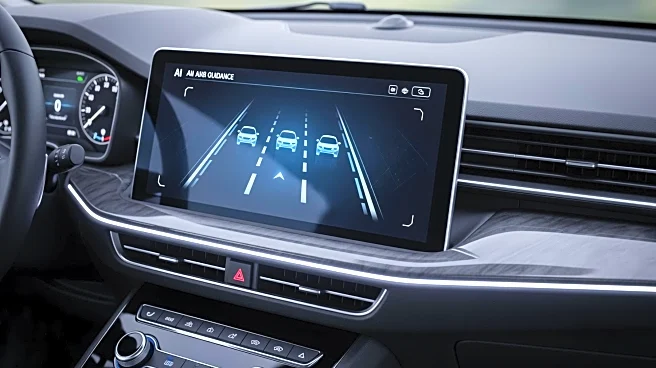What's Happening?
Polestar 4, a popular electric vehicle, has integrated a new AI-powered feature to assist drivers in navigating lane changes more effectively. This update incorporates Google Maps' live lane guidance into the vehicle's 10.2-inch driver head-up display.
The system utilizes Google's on-device artificial intelligence to interpret lane markings, road signs, and other visual cues through a forward-facing camera. This data is combined with Google Maps navigation to provide drivers with visual reminders and audio alerts for timely lane changes. The feature aims to prevent last-minute lane changes by offering clear visualizations directly in the driver's line of sight, enhancing safety and reducing stress during navigation.
Why It's Important?
The introduction of AI-powered lane guidance in the Polestar 4 represents a significant advancement in automotive technology, particularly in enhancing driver safety and convenience. By reducing the likelihood of last-minute lane changes, this feature can potentially decrease the risk of accidents, especially in unfamiliar driving environments. The collaboration between Polestar and Google highlights the growing trend of integrating advanced technology into vehicles to improve user experience. This development could influence other automotive manufacturers to adopt similar technologies, thereby setting a new standard for in-car navigation systems.
What's Next?
The new lane guidance system will be rolled out to Polestar 4 owners in the US and Sweden through an over-the-air software update in the coming months. As the technology proves successful, it is expected to expand to more markets and road types. This could lead to further collaborations between automotive brands and tech companies, aiming to enhance vehicle safety and navigation features. Stakeholders such as car manufacturers, tech firms, and consumers will likely monitor the impact of this technology closely, potentially driving further innovations in the automotive industry.
Beyond the Headlines
The integration of AI in vehicle navigation systems raises questions about data privacy and the ethical use of technology in cars. As vehicles become more connected, ensuring the security of data collected by AI systems will be crucial. Additionally, the reliance on technology for navigation may alter driving habits, potentially reducing the need for traditional map-reading skills. This shift could have long-term implications for driver education and the automotive industry as a whole.















